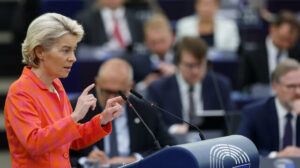A saga that has lasted nearly four months is expected to come to a close tonight in Strasbourg, as MEPs attending the plenary session of theEuropean Parliament will be asked to decide whether to give a vote of confidence to the College of Commissioners, or “Commission von der Leyen 2.0”.
The second European Commission led by Ursula von der Leyen is expected to take up her official duties on December 1, as the European Parliament’s political groups managed to reach an agreement in principle last Wednesday to give not only the green light to the new executive body of the European Union, but also the… hands to complete a shambles within the EU’s second legislative body , which almost turned into a travesty.
The negotiations and the “pact of partnership” of the EP’s political groups
Last July, the European Parliament, as defined by the EU treaties, gave a vote of confidence to President von der Leyen by 401 votes in favour, 284 against and 22 blank or invalid votes. The procedure is not markedly different from what happens in most EU member states. That is, citizens vote on the composition of the Parliament, in this case the European Parliament, and then MEPs vote for or against the government. In the case of the EU, the European Commission, the executive body of the Union.
However, in the last 20 years at least, the EU has evolved, from something that seemed distant to European citizens, into a de facto political union, where almost every confrontation, even in the smallest member states , has a European impact. In this context, the halls in Brussels and Strasbourg, when required or when it is necessary, become megaphones of disagreement between not only EU member states and political groups, but even MEPs who refuse to toe the party line.
An unnecessary confrontation
Over the past decades, the European Parliament has managed to bring together, despite occasional disagreements, the so-called “pro-European political groups”, namely the center-right (European People’s Party, EPP), center-left (S&D Social Democrats), Liberals (Renew) and Greens, to gather the necessary majority to vote in favor of flagship EU policies.
However, after the 2024 European elections, things have changed dramatically. Far-right parties, in the sense that they are to the right of the EPP, such as “The Patriots”, “European Conservatives and Reformists” (ESR), and “Europe of Sovereign Nations” (ESN), although they have not registered a huge rise, nevertheless cannot be ignored. In 2019, political groups to the right of the EPP controlled 18% of the seats in the European Parliament, and in 2024, they controlled 26%.
The bras de fer and the (necessary?) compromise
The weeks that followed Ursula von der Leyen’s re-election as Commission President looked like a “playground” to some and a shift in the balance of power within the European Parliament to others.
It took more than 80 hours of hearings of the 26 proposed commissioners to get 19 of them approved by the relevant EP committees. The six Executive Vice-Presidents of the Commission, as well as the proposed Commissioner from Hungary, Oliver Varheli, were briefly put on ice.
The trigger was Ms. Teresa Ribera (Social Democrats, Spain and number 2 of the new Commission) from Spain and Mr. Raffaele Fito (Fratelli d’Italia, and Georgia Meloni’s choice).
Ms Ribera’s European Parliament hearing was the backdrop to a fierce clash over her responsibility for the tragic flooding in Valencia, which claimed the lives of 222 people, as she was at the time the minister in charge in Spain.
She was responsible for the deaths of 222 people in Spain in the last two years.
The clash, however, was also about pressure from Spain’s Partido Popular, the center-right party that is part of the ELP and which is in coalition in Valencia’s local parliament with the far-right VOX, not to appoint Ms. Ribera as executive vice-president of the commission until she had testified in the Madrid parliament.
The EPP backed the Partido Popular’s proposal and just when many thought there would be an issue with the approval of the College of Commissioners, everything changed overnight. The EPP, Social Democrats, Greens, and Liberals signed a “living together” pact, effectively renewing the vows they had made last summer.
So what’s all the drama about?
President von der Leyen’s European Commission is expected to be re-elected, barring the unlikely event. Only a simple majority is required. That is 50% of the MEPs present tonight at the House’s plenary session in Strasbourg.
However, as newmoney.gr was told by a source with excellent knowledge of the correlations within the EP, “the issue is not the majority. That is guaranteed. The issue is abstention. In 2014, 89 MEPs abstained. If the number of MEPs who choose to abstain increases, there will be an issue.”
The so-called “pro-European majority” is not certain to continue, at least unconditionally, throughout the five years of the new European Commission. The rise, however slight for the moment, of the far-right parties offers a good way out for the EPP (the political group to which President von der Leyen belongs), which can form ad hoc alliances as well as pervert the political groups sitting on its left.
However, even within the “pro-European alliance” there are objections to the election of the College of Commissioners, as the French MEPs of Renew, the Liberals, i.e. the EP, will vote against it, while MEPs from Viktor Orban’s Fidesz party are expected to vote for it.
Happy for the Greens, von der Leyen nears 401 votes
On Monday, Ursula von der Leyen made a checkmate move. The European Commission president announced the hiring of former Green co-leader of the EP Philippe Lampertz as her adviser on the transition to a climate-neutral economy. A move that will, by all accounts, give her the so-called “Zugzwang”. In other words, the forced move will give it a victory on the European “chessboard”.
What the Greek MEPs will vote on.
The four Syriza MEPs who are part of the Left political group will vote against Ursula von der Leyen’s Commission. This will also be done by the 2 MEPs from the KKE, who do not belong to any political group and belong to the so-called “non-registered”.
The 7 MEPs of the ND (EPP) and the MEPs of PASOK are expected to vote in favor of the new Commission.
Ask me anything
Explore related questions





